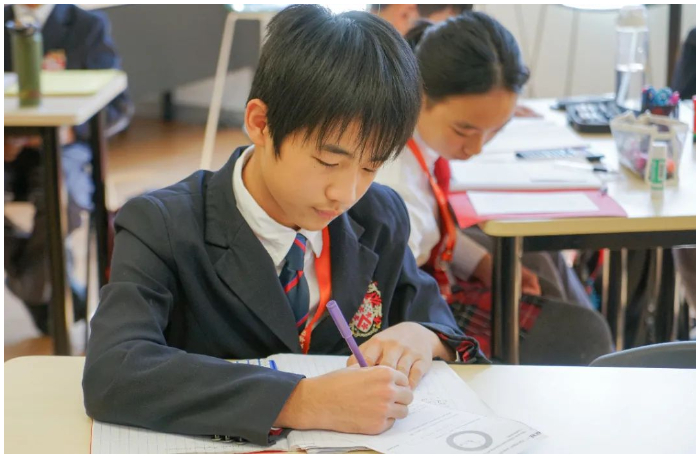Dulwich College Puxi Students Excel at UK Maths Challenge
On Friday, 29 April, Our Year 7 and 8 students and some enthusiastic problem solvers from Year 6 took part in the UKMT Junior Maths Challenge, which is open to students from all over the world. The challenge itself is a 60-minute, multiple-choice competition that encourages mathematical reasoning, precision of thought, and fluency in using basic mathematical techniques to solve interesting problems.
The problems on the Junior Mathematical Challenge are designed to make students think. Most are accessible, yet still challenge those with more experience. It is the perfect way for students to see how some abstract topics in number and geometry can be applied to larger problems.
Mathematics at Dulwich is all about challenge, reasoning, and depth of understanding, which is why the UKMT Maths Challenges are such an important part of the academic calendar. Applying mathematical understanding to new situations develops the transferrable skills that are so important for deeper learning, and opens up enquiry into a huge array of new questions that can be explored across many other subjects.

Every year certificates are awarded to the top 40% of students. Bronze, Silver and Gold certificates are then given to the top 40% in the ratio 3:2:1, meaning that a score in the top 6.7% is required to achieve a Gold certificate. Out of those who achieve a Gold certificate, around 1200 students worldwide are invited to take part in the Junior Mathematical Olympiad, a two-hour paper that provides ten challenging starter questions followed by six tough questions that challenge reasoning skills and require full written responses to prove their answers. Jayden in Year 8, achieved an incredible score of nearly full marks in the Junior Maths Challenge, and so will take part in this event on Tuesday, 14 June. Huge congratulations to him for this incredible achievement!

Other high scoring students in the UK who achieved well above the threshold for Gold are invited to take part in the follow up round, the Junior Kangaroo. Overseas students are unable to take part directly in the competition, but we are delighted to run this opportunity internally for our high scorers on Tuesday, 14 June, in preparation for future Olympiads.
Further certificates are also given to the highest performing student in each year group, and in the whole school. Our students were able to obtain the following certificates:
12 Gold
(Including 1 entry to the Junior Mathematical Olympiad and 8 scores equivalent to entry to the Junior Kangaroo)
13 Silver
14 Bronze
By Year Group:
Year 6
Silver and Best in Year
Deklan L
Silver
Lien L
Bronze
Jing R, Daniel Z
Year 7
Gold, Junior Kangaroo and Best in Year
Chris W
Gold and Junior Kangaroo
Christine H, Kevin Z
Gold
Aedan W, Lynelle Y
Silver
Jayden H, Carel P, James P
Bronze
Sean B, Ana L, Emma M, Poppy T, Grace W, Melody Z
Year 8
Gold, Junior Mathematical Olympiad entry and Best in School
Jayden C
Gold and Junior Kangaroo
Shuang C, Emily L, Justin X, Louie Y, Andrew H
Gold
Tina T
Silver
Regina B, Madeleine B, Hedy C, Jenny C, Leona S, Tian Le G, Eason W, Fred X
Bronze
Louise C, Muse C, Nafisa E, Ciara M, Isaac R, Otto T
These fantastic results follow on from our Senior Challenge students earlier this year – Aidan M (Y12) and Daniel Y (Y10) who both achieved a Merit score in the British Mathematical Olympiad and the Senior Kangaroo respectively. Congratulations to everyone who took part, and especially to those who obtained medal certificates. A huge thank you also to Mr Pickhaver and Mr Wright for helping to prepare our Year 6 students.

To see what sort of problems our Olympiad students will face, why not challenge yourself to a question taken from the 2021 Junior Olympiad? Answer at the end of this article.
Q: The product of five different integers is 12. What is the largest of the integers?
Answer: 3
The integers cannot all be positive, as 1 x 2 x 3 x 4 x 5 is already 120. The prime factorisation of 12 = 2 x 2 x 3. Given that zero and fractions must be excluded, the other two numbers must be of a size no greater than 1. So we can use 1 x -1 x 2 x -2 x 3.





